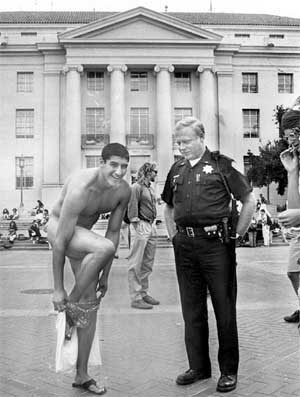Andrew Martinez (Andrew Martinez)

Andrew Martinez was a high school football player when he attended Monta Vista High School in Cupertino, California. Martinez attended classes at the University of California, Berkeley. In September 1992, his second year in college, he began appearing naked in public and led a campus “nude-in” to protest social repression. Campus police first arrested him that fall for indecent exposure when he jogged naked near southside dormitories late on a Saturday night. The county prosecutor refused to prosecute, concluding that nudity without lewd behavior was not illegal. Martinez began strolling around campus naked, citing philosophical reasons. He explained that when he dressed in expensive, uncomfortable, stylish, “appropriate” attire, he hid the fact that his personal belief was that clothes were useless in his environment except as a tool for class and gender differentiation. The university then banned nudity on campus. AndMartinez wrote a 1992 guest column in the Oakland Tribune: “When I walk around nude, I am acting how I think it is reasonable to act, not how middle-class values tell me I should act. I am refusing to hide my dissent in normalcy even though it is very easy to do so.” Martinez, who typically attended classes wearing only sandals and a backpack, became a cause célèbre at the university for a while, participating in a number of nude events on campus and performances by the Bay Area nude performance group the X-Plicit Players. He appeared on national talk shows, was profiled in a photo essay in Playgirl and was parodied in the 1994 college comedy PCU. As a response to Martinez’s actions, UC Berkeley issued its “Policy Statement Concerning Public Nudity and Sexually Offensive Conduct” banning public nudity on December 7, 1992.
Then neither employed nor furthering his education, Andrew Martinez continued living in Berkeley, and was arrested for public nudity by the city. He fought those charges and won. It remained legal to walk around nude in Berkeley and he went further, attending a City Council meeting naked. The city adopted an anti-nudity ordinance in July 1993. Martinez and some of his supporters again showed up at a City Council meeting in the buff and he became the first person arrested under the new city ordinance. He pleaded guilty to the misdemeanor charge and got two years’ probation. After his legal matters were settled, Martinez began wearing clothes again and began to write a manuscript about his experiences. He traveled to Europe and studied judo. After his return and continued unemployment, he began to manifest symptoms of mental illness and he spent much of the decade following his period of national attention moving among halfway houses, psychiatric institutions, occasional homelessness, and jail, but never getting comprehensive treatment, his family said. Martinez showed signs of schizophrenia and was prescribed medication, but with little improvement. “It was an endless cycle of trying to get answers but never getting any,” said his mother. “It was endless, endless, endless.”
On January 10, 2006, Andrew Martinez was arrested after a fight at a halfway house and charged with two counts of battery and one count of assault with a deadly weapon. He was placed in maximum-security custody in Santa Clara County Jail in San Jose. The last time Martinez’s mother saw her son was three weeks before his death when she visited him in jail. “He was sad. He was tired. He said he had enough,” she said. “I alerted everyone, but nothing happened.” On the evening of his death a guard checked on him at 11 p.m. and he was fine, but a few minutes later other inmates reported hearing sounds coming from his cell. An officer returned at 11:19 and found Martinez unconscious. The 33-year-old Martinez was found with a plastic bag cinched around his head. He was taken to Santa Clara Valley Medical Center, where he was pronounced dead of apparent suicide on May 18, 2006. Andrew Martinez’s funeral was held May 25. A memorial for him was held May 27 at the People’s Park in Berkeley. On November 12 of that year, a public memorial was held at a community recreation center in Cupertino. In 2009, his mother Esther Krenn settled a wrongful death lawsuit against Santa Clara County, which paid her $1 million and altered its policies so that family members would be notified in the event of a suicide attempt.
Born
- November, 15, 1972
- USA
- Santa Clara County, California
Died
- May, 18, 2006
- USA
- Santa Clara County, California
Cause of Death
- suicide

